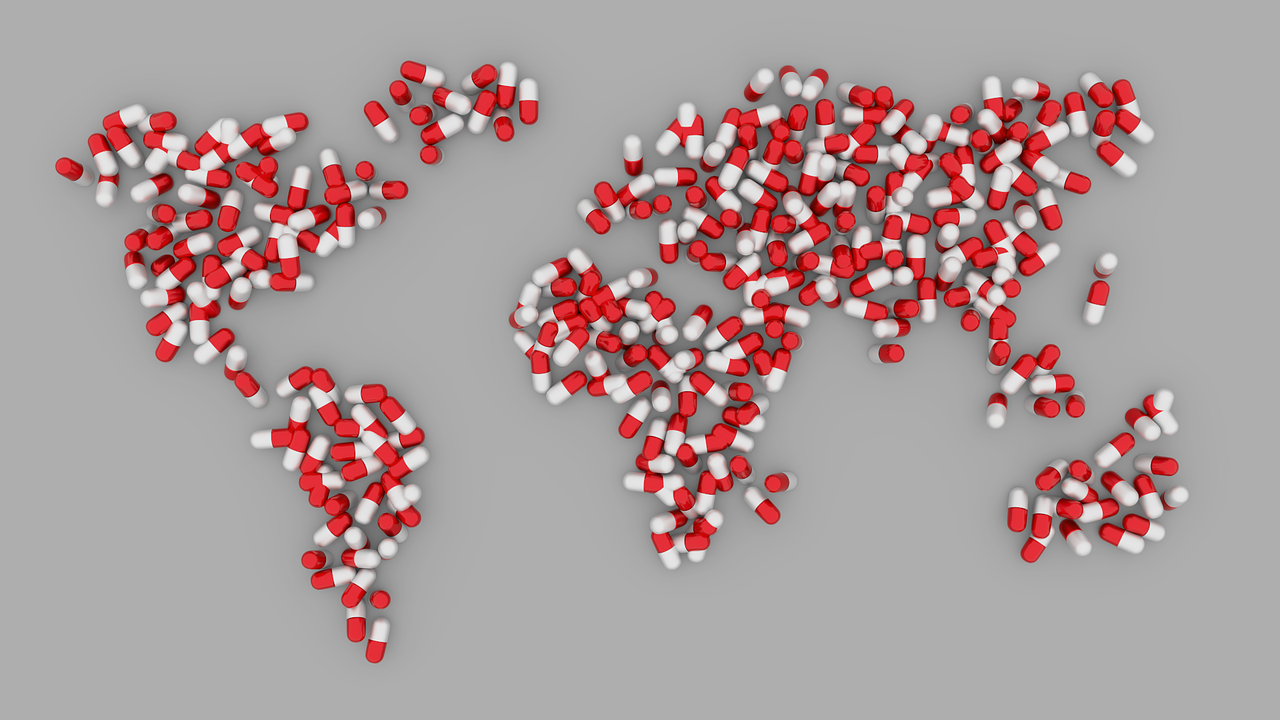ASIA Emerging Healthcare STARTUP HUB
26 July 2017 | Analysis
Despite unique challenges, the past decade has seen a number of biotechnology startups establishing themselves in many Asian countries

Source: Pixabay
Gone are those days when medical research and innovation was only the forte of big pharmaceutical companies or research institutions. Nowadays healthcare startups are coming up with novel ideas, promising new discoveries and better healthcare delivery using simple apps or technologies. Rising income levels, an ageing population, increasing prevalence and awareness of lifestyle diseases have led to a strong demand for health-care services in Asia, leading to burst of many healthcare startups across the continent.
Creating a new record, Venture capital (VC) funding including private equity and corporate venture capital- in the Healthcare IT sector came in at $5.1 billion in 622 deals in 2016. Significant percentage of Asia’s population lies below national poverty line and reside in remote areas without access to basic health services. Many startups have worked towards providing basic health services to these people by successfully marrying technology and healthcare together, creating unique healthcare models. As healthcare systems across Asia modernize, these startups are racing to capture new opportunities and cash in on Asia’s untapped opportunities.
The past decade has seen a number of biotechnology startups establishing themselves in many Asian countries. “The Asia Pacific is a dynamic region with growing opportunities for business,” underscored, Dr Carl Firth, Chief Executive Officer and Founder, Aslan Pharma. “Specific to the healthcare sector, demographic trends such as ageing populations, a rise in chronic illnesses and a growing incidence of non-communicable diseases, along with greater pressure and demand for better value-based healthcare outcomes, have given rise to the need for better innovations. The rise of venture capital has also been a game changer for startups in Asia. In Singapore alone, the total value of private equity and venture capital (VC) deals in 2016 was S$3.5 billion. There has also been a shift in the focus VC firms who are now paying attention also to companies in later-stages of growth, providing more support to companies who need funding beyond their initial stages.”
Japan, being a hub for innovation, has always led the way for biotechnology development and investments in Asia. China, South Korea and India with their huge population and healthcare challenges are emerging as biotech clusters with many notable startups in the region. New entrepreneurship communities have also emerged in Malaysia and Indonesia. The implementation of Universal Health Coverage in Indonesia has spurred the demand for quality healthcare services in the country, thus attracting investments from companies and investors alike. Australia, too, is an emerging market for health opportunities and is considered as a global leader for e-health. It is one of the very few countries that has integrated e-health into its health systems. Taiwan has exhibited very strong medical devices R&D capability that attracts investment opportunities. E-health is considered as one of the highlights by government in Taiwan and it has set funding to attract foreign medical devices & e-health companies to set up in Taiwan.
Asian governments are playing an active role in creating a fertile ground for start-ups to thrive and flourish. Kane Black, CEO, Novasatra, highlighted, “Asia is starting to develop biotech hubs as some of the more developed economies. Singapore and Taiwan, for example, are investing heavily to carve their niche in this industry by encouraging entrepreneurs and developing their local talent pool. This push is creating a more conducive environment for the launch of innovative healthcare companies with compelling business plans, and investors are taking notice.”
Start-ups that attract VCs
Immuno-oncology, cancer metabolism, gene therapy, orphan diseases, autoimmune disorders – there are a broad range of disease settings that are capturing the excitement and imagination of investors today. Despite recent trends that suggest mobile health, nanotechnology and personalized medicine to be the future of healthcare, it is the pharmaceutical sector that attracts nearly 70 percent of the capital funding in Asia. Historically, most of the venture capitalists investments in this sector tend to go in late stage drug development companies and generics and funds are mostly concentrated on low-risk growth capital opportunities. Vaccines, molecular diagnostics and biosimilar are other burgeoning sectors in life sciences that are attracting huge amounts of investments.
Black explained, “Sectors which address the most critical issues facing the growing population and aging citizens are attracting the most investment right now. As the demographics in Asia shift, we are seeing a growing incidence of diseases like cancer and there is a high unmet need. Historically, investors in Asia have been reluctant to invest in biotech because of a long investment cycle and comparatively higher risk. However, the biotech industry is starting to mature and focus on their local opportunities in the region and investors are responding to this. Startups are developing products and solutions that serve their local markets instead of trying to compete in the US and Europe where the industry is quite crowded and less amenable to new technologies.”
While the life science sector has shown astounding growth in terms of scientific talent and government support to foster the biotechnology industry, funding for high risk models that support innovation have continued to be a challenge. In countries like the US and Europe most of early stage drug development is funded by the government, however, Asian countries do not have such backup mechanism and are still reliant on venture capitalists to support early stage R&D.
Dr T S Balganesh, President, GangaGen Biotechnologies, stated, “The opportunity for funding in Asia is greater than before due to more investors and wealthy individuals emerging in the region and looking to support new companies. We are also seeing increased investment from the government. India, for example, has programmes in place to support novel ideas with seed financing. This initial injection of funding gives companies a head start to test their ideas and build confidence with investors. Many companies, like GangaGen, were initially funded from outside the technology to recalibrate existing business models and invent disruptive solutions. Many giant pharmaceutical companies have recognized this potential of startups and are forming alliances thus bringing each other immense opportunities through collaborations, creating winwin situations for both. For example, Healthcare giant Johnson & Johnson works with startups in a number of different ways, including running accelerators and investing and partnering directly with small firms AstraZeneca runs an Open Innovation policy that aims to collaborate with academic institutions, biotech firms and pharmaceutical companies on drug discovery, from the first idea to early clinical deployment.
“These alliances allow big companies to leverage the specific expertise of the startup and gain access to a technology that enhances their own pipeline or business, said Dr Balganesh, “They also allow startups to focus on what they are best at, developing innovative science, while leveraging the clinical development and marketing expertise of the larger pharmaceutical companies to get their novel products to customers. The alliances are a win for both parties, and GangaGen intends to follow this same pathway to get its novel ectolysin products to patients that could benefit from them.”
Why many healthcare startups fail?
“The key challenge for the Asia Pacific is the region’s sheer diversity,” stated, Dr Firth, “Demographic and market differences mean that a product or service that works in a highly developed market, would likely be completely upturned when launched or implemented in an emerging economy. Startups who have regional aspirations therefore need to develop business models that can be applied across multiple markets. Startups who build a degree of agility into their DNA would find it easier to adapt to the different and ever-changing demands of the region. But this diversity is also the greatest single source of opportunities for those operating in the region. The nature of the many emerging economies in the region mean that consumer demand and spending power will change in the years to come. The entrepreneurs who will succeed are those who can identify these needs, and at the same time, pair them with their personal aspirations, allowing them to make a real difference for their consumers.”
Also, it appears that the venture capital industry in Asia has not grown phenomenally to support the growth in scientific knowledge and to capitalize on this opportunity. Biotech industry in Asia is very nascent in comparison to the US and Europe and venture investments into the Asian life science sector are still emerging. Around $8 billion is actively managed in Asia into healthcare investments, while in the US and Europe hundreds of billions of dollars is used to manage healthcare business.
Dr Balganesh said, “There are many promising biotech companies founded in Asia, based on Asian science, but financing product development is one of the greatest challenges for these companies. Companies like GangaGen, which are working to address a very serious healthcare issue through a product that represents a paradigm shift in the treatment approach, are more challenging for investors to evaluate than companies following more traditional paths. Investors may be reluctant to engage a company with the long and uncertain timelines inherent in drug development. This can lead to a company “failing” before it has had the time to reach critical development milestones. However, the payoff for the patient investor can be substantial, both financially and in terms of having a real impact on people’s health and wellbeing.”
Though there are many Asian startups with path breaking discoveries, here we bring you the list of 10 noteworthy healthcare startups from Asia.
Alodokter (Indonesia)
Founded in 2014, Indonesia’s online portal, Alodokter. com is the leading health and medical website in Indonesia with over 12 million monthly active users. It offers content about health, well-being and family in Bahasa Indonesia. The startup launched the Alodokter app in March 2016 that claims to be the leading telemedicine app in Indonesia with over 150,000 users’ questions answered every month by doctors via its chat platform. The startup had closed a $2.5 million Series A round led by Golden Gate Ventures in 2016.
mClinica (Singapore)
Singapore based startup mClinica aims to build a digital network of drug companies, their distributors, pharmacies, and patients on a common platform. By unifying them, the company’s network collects comprehensive data that allows for the deployment of programs to improve patients’ health outcomes and access to affordable medicine. The company announced that it recently bagged $6.3 million in series A funding, one of the largest healthcare financings in Southeast Asia.
Medical Departures (Thailand)
Bangkok-based Medical Departures is an Airbnb for medical tourism where travelers are patients and their hosts are qualified medical professionals. Its promise is access to affordable and quality healthcare for patients who want to travel abroad to find it. The startup connects patients to doctors of various specializations in markets including Thailand, Vietnam, Philippines, Malaysia, South Korea, Indonesia, Mexico, and Costa Rica – all of them top destinations for medical tourism. The company recently raised a series A funding round worth US$2.5 million.
ConneXionsAsia (Singapore)
ConneXionsAsia, a Singapore based technology startup founded in 2013. CXA brings evidence-based wellness into the workplace to improve employee health and control healthcare costs. Employers use the CXA platform to consolidate their vendors into a one-stop marketplace, and to digitize claims, health data and payment flows between employees, employers, insurers and providers. Instead of purely offering advice, CXA delivers solutions to companies by using data to make targeted recommendations, and by bringing the best wellness and disease management providers. Today, CXA has grown into a $100 million company working with employers to transform current healthcare spending from treatment into benefits and wellness programs where employees in Asia choose their path to good health. The platform shifts the paradigm from treatment to prevention of disease. To encourage employees to live healthier lifestyles – which would, in turn, translate into long-term benefits for the company.
ASLAN Pharmaceuticals (Singapore)
ASLAN Pharmaceuticals, a Singapore based oncology focused biotechnology company developing a portfolio of immunotherapies and targeted drugs to treat Asia prevalent cancers. ASLAN’s focus on these diseases, which include gastric, liver and biliary tract cancers, is filling the gap for treatments that can vastly improve patient outcomes. Instead of developing these drugs in the West, ASLAN has concentrated clinical development in Asia, where the patients and disease experts are located. This has significantly accelerated the progress of its pipeline development. The company’s lead asset varlitinib, which is entering two global pivotal trials, for biliary tract cancer and gastric cancer respectively, is an example of how the company is moving its pipeline towards future commercialisation in less than a decade.
LifeTrack Medical Systems (The Philippines)
Philippines based Lifetrack’s radiology software platform pairs hospital residents with experienced radiologists who help evaluate medical images and send their reports. Already deployed in Southeast Asia and South Asia, Lifetrack’s patented platform is extending the reach of high quality medicine by greatly simplifying and speeding deployment of digital radiology, all while significantly reducing costs, and solving the greatest challenges of bringing high quality diagnostic reporting to large underserved populations. In April 2017, the company announced US FDA approval of its Lifesys PACS, the first 4th generation PACS enabling truly distributed radiology for better healthcare.
Prenetics (Hong Kong)
Hong Kong based Prenetics is the leading genetic testing/ digital health company in Southeast Asia that aims to empower individuals with valuable health information. With a simple saliva sample, individuals can discover how their genes affect their diet, drug response, disease and cancer risk.
This information enables people to make health a choice, by living healthier and proactively preventing diseases. The company, has recently raised a $10 million Series A round for its DNA testing technology that helps doctors provide more accurate diagnoses and better understand their patients.
GangaGen (India)
India’s GangaGen aims to address the most critical issue prevailing today-anti microbial resistance. GangaGen is developing highly specific novel therapeutic proteins called ectolysins to address antibiotic resistance, a critical public health threat. The company is also developing a pipeline of ectolysins to target other clinically meaningful indications such as tuberculosis and Gram-negative infections.
Nova Satra Dx (Singapore)
Based in Asia’s technology hub, Singapore, Nova Satra Dx, a molecular diagnostics company developing and commercialising blood-based molecular diagnostic tests that provide rapid and accurate detection of cancer based on epigenetic targets specific to Asia-prevalent cancer sub-types. The company is developing a pipeline of tests based on validated technology, the NovoTect platform, to address unmet medical needs in cancer diagnosis specifically for Asian patient populations.
The company’s first test, NovoTect Bc for the diagnosis of breast cancer, is the first ever test that stratifies Asian patients regardless of sub-type and stage of breast cancer with high specificity and sensitivity. The company has secured $2 million (S$2.8 million) in funding from Genting Bio Cellular Sdn Bhd, a whollyowned subsidiary of Genting Berhad
Molcure (Japan)
Japan’s Molcure is antibody-drug-focused biopharmaceutical company whose passionate associates are dedicated to improving the lives of patients by developing and providing more effective therapeutics and supportive care products. Molcure represents high quality antibody and target discovery with cutting edge technology in-house. At Molcure they combine a deep knowledge of NGS, bioinformatics and antibody biology with automated discovery system. The antibody discovery platform Abtracer delivers superior functional antibodies. Molcure has won a contract for a feasibility study with a large pharmaceutical company and is in negotiations with a number of others.












